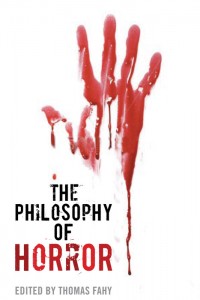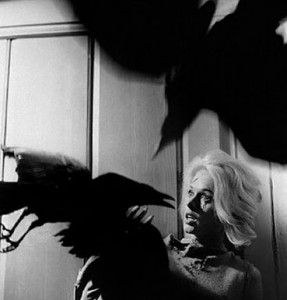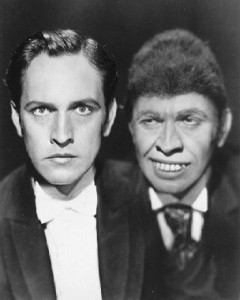 My most recent book review copy arrived in the form of The Philosophy of Horror (The University Press of Kentucky, 2010), edited by Thomas Fahy. The press release for the volume sets the stage for what is in store for the reader:
My most recent book review copy arrived in the form of The Philosophy of Horror (The University Press of Kentucky, 2010), edited by Thomas Fahy. The press release for the volume sets the stage for what is in store for the reader:
The Philosophy of Horror investigates the reasons that audiences continue to revisit horror and in the process explores the social and ethical underpinnings of some of American culture’s most well known horror television, film, and literature. Each essay takes a look at the ways in which horror inspires philosophical and cultural discussion, focusing on its ability to twist our notions of rationality and perception of nature. The volume specifically targets the horror genre’s exploration of morality, identity, cultural history, and aesthetics, effectively analyzing all that defines horror as a genre.
The collection examines both new and classic horror productions, exploring the cycle of anxiety, fear, and relief that creates the foundation for each emotion. Fahy acknowledges the repetition of certain narrative themes through the genre and emphasizes that horror’s subtle variations are part of its appeal; as the audience reads or watches the same narrative, they continue to discover new things about their own culture which may be humorous, disturbing, or insightful.
The book covers a broad span of time, beginning with horror’s unofficial inception in the 1800s and investigating the genre’s changing artistic and philosophical ideologies. For instance, Fahy and his contributors explore the use of violence in classics like The Shining, and take a look at the new torture-horror subgenre as seen in Saw and Hostel. They also study the emergence of new mediums within the genre, like horror television, and delve into the nuances of “campy horror.”
Philip Tallon is one of the contributors to The Philosophy of Horror who discusses the volume and his chapter within it below. Tallon received his PhD in theology at the University of St. Andrews, where he is a part of the Institute for Theology, Imagination, and the Arts. He has taught in a variety of university settings, including Asbury College and the University of St. Andrews in philosophy and theology. He is currently an adjunct faculty member at Asbury Theological Seminary.
TheoFantastique: Philip, thank you for coming here to discuss the new book and your contribution to it. At times in the past I’ve received criticism from those with a conservative religious orientation due to my interest in and exploration of horror. So let me ask you: what’s a nice religious person like you doing exploring a genre like this?
Philip Tallon: It’s a fair question. Sex and violence in movies certainly raise moral questions, not just about the ethics of what is depicted, but about whether we should even watch certain kinds of things. Christian recognize, rightly, that there can be harm done even in the viewing. What we watch does affect our hearts and minds. So we’re (hopefully) a bit intentional about the kind of entertainment we consume. Though it is interesting to note that sex and violence are not equally scandalous to the average Christian viewer. From what I’ve observed, most Christians will blush at the least bit of sex, but won’t blink at quite a lot of blood. So Mel Gibson’s hard-R movies get a pass but not a PG-13 movie with sexual content.
However, horror is usually the exception to this rule, because the violence is often so meaningless and extreme that it raises the hackles of Christians that don’t mind a lot of killing in, say, war movies. And, to be fair, a lot of horror films probably aren’t defensible as having any kind of redeeming value.
 So I’m not a horror apologist, per se. If scary movies give you nightmares, by all means go see a comedy. But I do think there are lots of good horror films that are worth watching. And that horror as a whole is worth examining. On the film side, my interest grew out of my love of Hitchcock movies: Psycho and The Birds kind of led me into the world of horror as an art form. On a more philosophical level, though, I started to look at the problem of evil as a grad student, and this led to my interest in the Christian understanding of evil, which in turn led to interest in the way evil was depicted in the Western tradition. So, whatever other religious people might think of my macabre interest in the subject, for me, the road to horror was paved with entirely good intentions.
So I’m not a horror apologist, per se. If scary movies give you nightmares, by all means go see a comedy. But I do think there are lots of good horror films that are worth watching. And that horror as a whole is worth examining. On the film side, my interest grew out of my love of Hitchcock movies: Psycho and The Birds kind of led me into the world of horror as an art form. On a more philosophical level, though, I started to look at the problem of evil as a grad student, and this led to my interest in the Christian understanding of evil, which in turn led to interest in the way evil was depicted in the Western tradition. So, whatever other religious people might think of my macabre interest in the subject, for me, the road to horror was paved with entirely good intentions.
TheoFantastique: Before we discuss the specifics of your chapter I’d like to talk a little about the book in general. How did the editor come to assemble a group of scholars with the goal of exploring philosophical issues related to horror?
Philip Tallon: We’ll, like a lot of academic publications I saw a call for essays and submitted an abstract. I know that the editor, Thomas Fahy, has published a number of young adult horror novels as well as edited a load of philosophical books on popular subjects. He teaches philosophy and actually writes horror, so he’s a good person to head up the project.
TheoFantastique: As you begin your chapter you refer to horror as a genre in the context of art. In what ways do you see horror functioning in this way?
Philip Tallon: This is a good question, and maybe the one that I am most interested in. Horror, as I note in the essay, is the most unremittingly negative of all genres. By most accounts America’s film and fiction industry’s are almost pathologically optimistic in their artistic outlook on the world. We like stories about success, love, and victory. But horror films intentionally upset us throughout and very often end unhappily, or at least suggest that the resolution is only temporary. This seems to defy the typical pattern. So why do we like them?
In some ways, this is the same problem Aristotle dealt with when talking about tragedy. Watching a tragedy entails a certain kind of suffering (for example, in feeling sympathy for the protagonist’s downfall). So why do we like it? Roughly, Aristotle said that the experience was cathartic. It purged from us the emotions of pity and fear in a safe and somewhat pleasurable way. Horror is obviously similar, we get to exercise our fight or flight reflex in a pretty safe way. The most likely consequence of watching a really scary movie is losing some sleep, which is pretty mild. In this way, horror movies are sort of cinematic roller coasters. They get our heart racing and hit us on a visceral level. But if thrills are what we want, why not just watch “thrillers”? They deliver surprises and scares but don’t aim to unsettle us. So it seems like horror as a genre is aiming at more than just delivering scares.
TheoFantastique: In what ways does horror connect with its audience that differentiates it from other aspects of art?
Philip Tallon: Part of what I argued in my essay was that horror functions as a mirror that we hold up to ourselves. In presenting ourselves with a picture of radical evil (whether moral or metaphysical, serial killers or monsters), we can see a bit more of who we are and what the world is.
TheoFantastique: You discuss how horror critiques “two broad cultural movements.” The first is “Enlightenment Hubris.” How does horror bring this critique, and what examples might illustrate this?
 Philip Tallon: “Broad” is the key word there. In a bit of bold philosophizing I painted the entire Enlightenment with a single moral brush, which is exactly the kind of thing I would mark my students down on their papers for. But the phenomenon I was talking about was more of the ambient utopianism and rationalism that seems to fill the air in Enlightenment thought. Horror, as Noel Carroll notes, grew up as a reaction to this rationalism and so punctures (helpfully, I think) any system that fails to take into account the human capacity for evil as a reality. Horror does this par excellence by rubbing our noses in the filthiest bits of the human soul: as Frankenstein or Picture of Dorian Gray or Dr. Jekyll and Mr. Hyde do, for instance. Very often in a horror film you have some skeptical scientist who doubts the existence of the monster, praises reason and rationality, and so is killed in the second act. Or often the scientists are villains. Not to pick on scientists, but in fiction they frequently stand in for the overly rationalistic attitude I think horror takes aim at.
Philip Tallon: “Broad” is the key word there. In a bit of bold philosophizing I painted the entire Enlightenment with a single moral brush, which is exactly the kind of thing I would mark my students down on their papers for. But the phenomenon I was talking about was more of the ambient utopianism and rationalism that seems to fill the air in Enlightenment thought. Horror, as Noel Carroll notes, grew up as a reaction to this rationalism and so punctures (helpfully, I think) any system that fails to take into account the human capacity for evil as a reality. Horror does this par excellence by rubbing our noses in the filthiest bits of the human soul: as Frankenstein or Picture of Dorian Gray or Dr. Jekyll and Mr. Hyde do, for instance. Very often in a horror film you have some skeptical scientist who doubts the existence of the monster, praises reason and rationality, and so is killed in the second act. Or often the scientists are villains. Not to pick on scientists, but in fiction they frequently stand in for the overly rationalistic attitude I think horror takes aim at.
TheoFantastique: You also note how horror critiques postmodernism and the moral order. How does horror raise the question of evil in ways that question postmodern assumptions about the natural order?
Philip Tallon: Again, broadly speaking, it seems to me that after the Enlightenment that the notion of any objective moral or natural order becomes much more suspect. So talking about objective value or human nature, if you talk about it among your average group of 20-somethings, will get you mostly blank stares. But a universe without a sense of real moral and even metaphysical order is ultimately a depressing idea. (By metaphysical I’m thinking of a classical conception of things have natures and ends, and those natures and ends fitting into a larger system). So I think that in an effort to re-establish order, we tell ourselves stories that show us there are still boundaries.Right and wrong still exist. Horror, in this way, by being so extreme in its presentation of evil, can be very reassuring. It shows us there is still an edge to the moral cliff by throwing us over it. This is the irony that Stephen King points out in his book on horror, Stephen King’s Danse Macabre, that while it may scandalize us with its transgressive use of gore, horror deep down holds very old-fashion values. I think King compares it to a Republican dressed in a monster suit.
In any case, whatever other flaws the genre may have, I think it does help us understand ourselves a little better. So I would recommend just about anyone who is interested in what art says about us thinking about schlocky horror films, not just Oscar contenders.
TheoFantastique: Philip, thank you again for your discussion here, for your contribution to the book, and for the book itself.
Related posts
“Christianity and Horror Redux: From Knee-Jerk Revulsion to Critical Engagement”
“Bryan Stone: Changing Religious Imagery in Horror”
“Rue Morgue – Divinity in Darkness: The Rise of Christian Horror”





3 Responses to “Philip Tallon: The Philosophy of Horror”